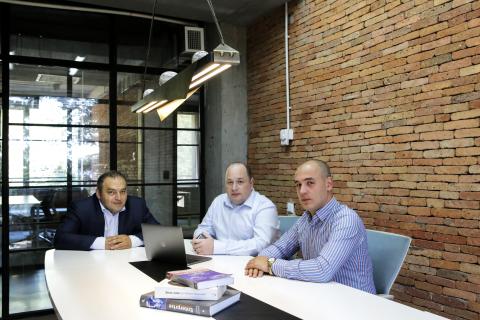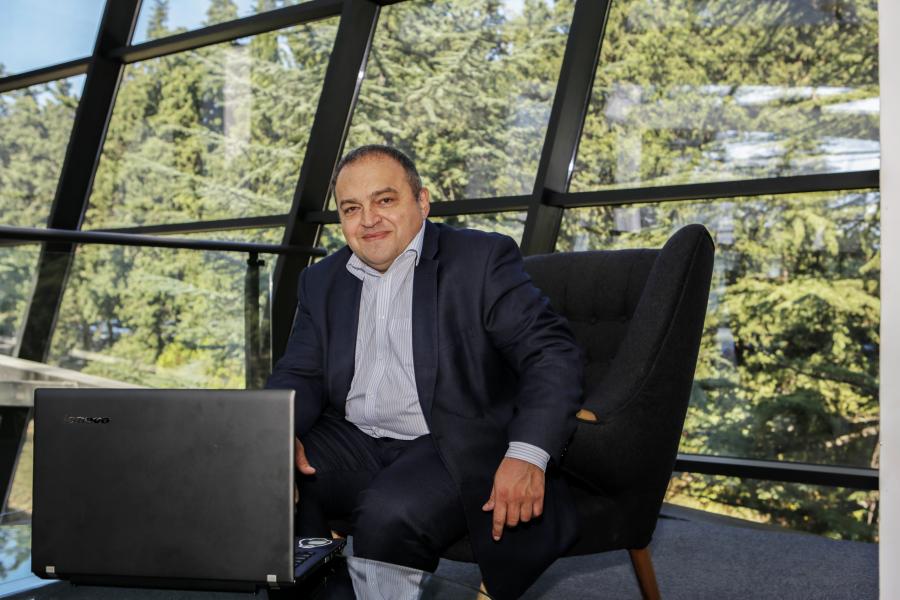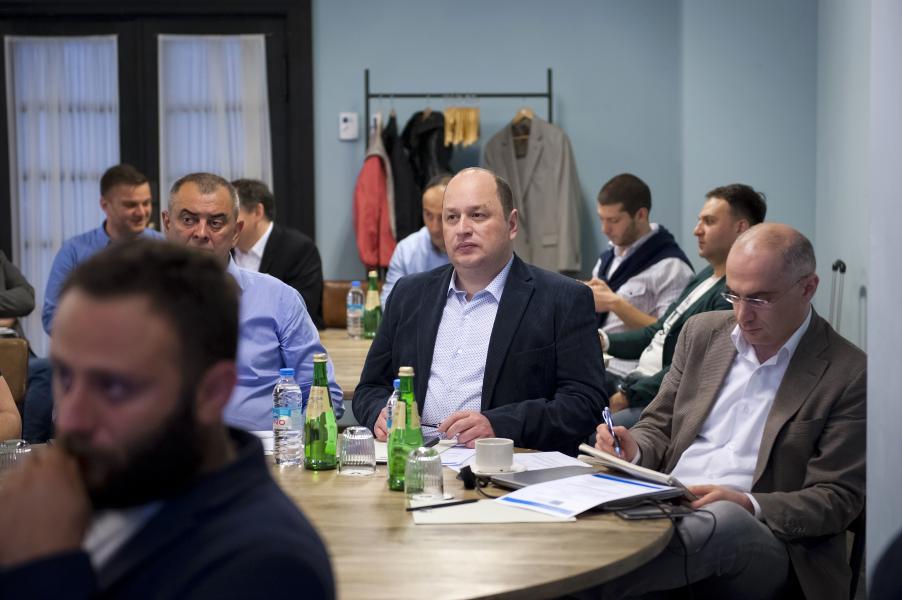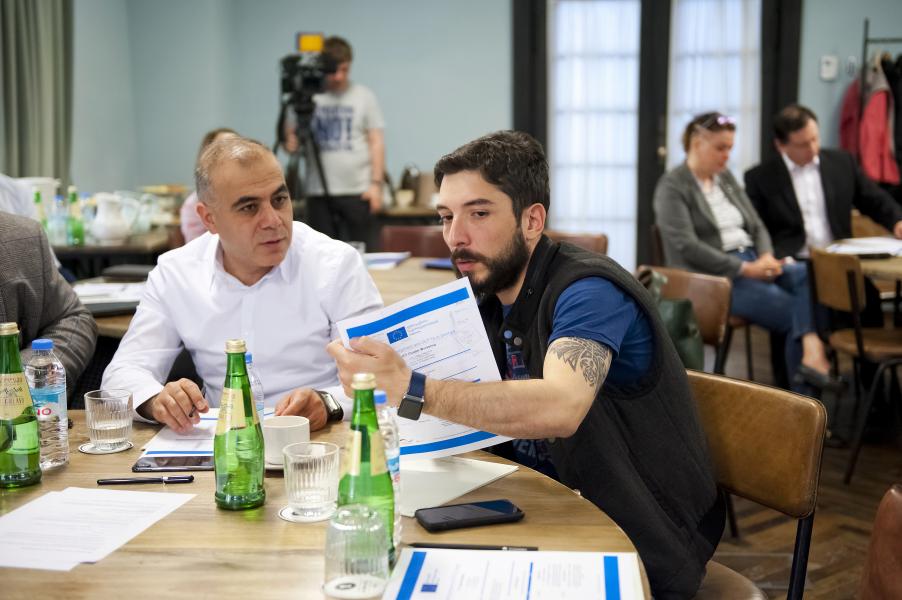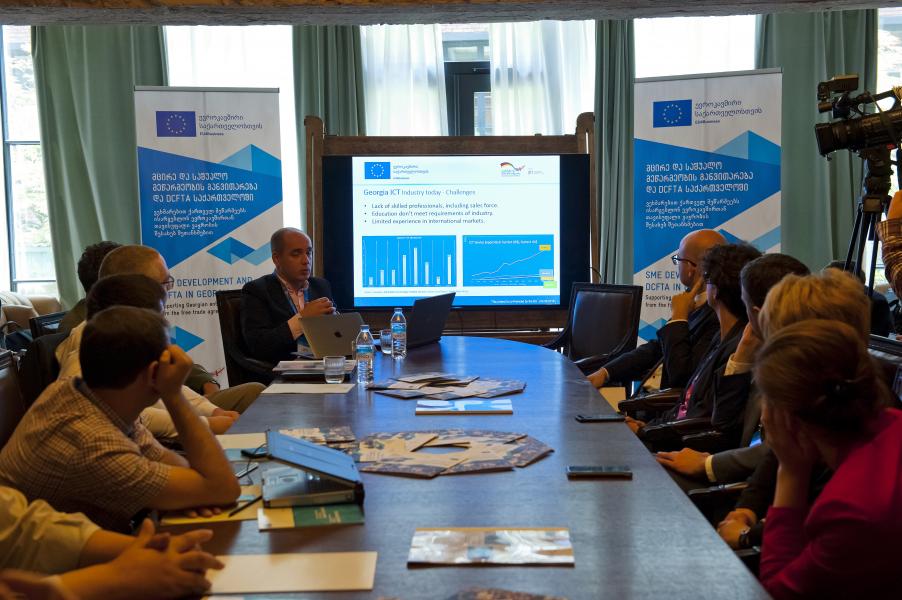Boxwood is one of the 11 companies that have come together with the aim of creating a unified cooperation platform of companies operating in Georgia’s ICT sector. George Keshelashvili, Executive Partner at Boxwood, believes this type of cooperation will be beneficial, both for the companies involved and the ICT sector as a whole, as the cluster will make it possible to address common challenges.
The establishment of a business cluster in the field of information technologies is a good practice that helps to increase competitiveness within the sector. For further development of the ICT industry in Georgia, companies need to joint efforts: “We should create a platform, which will help us to attract investors and additional funding,” says Keshelashvili. His company, Boxwood, provides software services.
A number of member companies are located in Tbilisi’s Mioni building, which was built in the 1970s. In the Soviet era, the building hosted a military factory and a scientific research institute. After the collapse of the Soviet Union, the building became non-operational until its privatisation in 2005. This is when it started to develop into an office space and high-tech companies moved in. Currently, 45 ICT companies have offices in the Mioni building, and four of them are members of the Cluster.
The Georgian ICT Cluster was established with the support of the EU-funded ‘SME Development and DCFTA in Georgia’ project, which is implemented by GIZ.
GIZ started this initiative in December last year. The main directions of the Cluster are participation in public policy development for the ICT sector, dialogue with state agencies, and education – fostering the development of a professional workforce that will meet current industry demands and the challenge of internationalisation.
Prospects for increasing the export potential of Cluster member companies
According to the preliminary sector study carried out by GIZ, 90% of customers of ICT companies are local organisations representing banking or retail sectors and governmental agencies. While ICT companies claim they are oriented toward expansion of their export potential, when asked about how often they participate in international trade fairs, only few of them confirmed they have such experience. Accordingly, the awareness of Georgian ICT companies on international markets is very low.
Cluster members working in the ICT sector acknowledge that for internationalisation it is necessary to build a strong brand of Georgian ICT companies. Trust toward this sector needs to grow, and sales and marketing skills should be developed.
Mikheil Skhiereli, an expert at the EU-GIZ project, says that Georgian ICT Cluster member companies have different directions and their employees have distinct professional skills, which gives him faith that membership of the cluster, establishment of a joint vision, and access to international markets will develop their export potential.
George Mzhavanadze, Executive Partner at Do So Management argues that membership of the cluster will benefit his company by building experience in delivering goods and services to the international market.
Mzhavanadze says: “We, Georgian ICT companies, have little experience in export of goods and services. Access to international market is associated with specific marketing costs, and it is difficult for SMEs to bear these costs on their own. Besides, it is tough to compete with other companies that are already established on the market. Through the cluster, we can consolidate resources and compete with experienced international companies with joint forces.”
David Japaridze, Executive Director of Azry, believes the Georgian ICT Cluster will be able to raise awareness of the industry on the international market. “It is necessary to build a brand and position Georgia as the country where local ICT players developed Public Service Hall, a governmental agency that provides public services to citizens and software support for banks and insurance companies.”
Japaridze also notes: “There are common challenges and problems; they may be dealt with by joining the cluster, if we want to attract foreign customers. Elaboration of a joint ICT strategy and an effective action plan is necessary. Cluster promotion and attraction of new members is one of our tasks.”
Defending the interests of the industry
The Georgian ICT Cluster aspires to be an entity that expresses the interests of the industry. It will participate in the elaboration of public policy with regard to the sector and will engage in dialogue with public bodies. It will also identify factors that hinder sector development and will elaborate and implement new initiatives through engagement with the appropriate public agencies and private sector.
Cluster members agree that the main obstacle for the development of the ICT sector is that the government does not tender procurement of ICT goods and services, instead relying on internal resources to meet their demands. “Our aim is to engage in a dialogue with the government and suggest procuring ICT goods and services from external service providers, so that the government does not compete with the sector development, which is in its own interests. If we draw a parallel between the creation of an electronic governance platform in Estonia and electronic governance reform in Georgia, we will see that the Estonian platform is fully developed by the private sector. The Estonian electronic governance platform has become a visiting card of the country,” says George Kheshelashvili.
Anzelika Rieck, the Deputy Team Leader at the EU-GIZ project, believes in Georgia‘s potential to develop its ICT sector, as Estonia once did.
“We believe that the industry's capacity and visibility on global markets will increase if ICT companies team up and build a cluster. That is why we value these 11 companies that showed a genuine interest in cooperation and development of joint projects. They are, of course, competitors but have elaborated a common vision with regard to developing the industry and building linkages with foreign markets like the Baltic States did years ago,” she says. As Georgia's Innovation and Technology Agency has provided facilities for the cluster’s operations, she suggests that it can lead to a demo centre in future. “The main idea of clustering is cooperation; it is like brainstorming – bringing innovative ideas to the table and thinking about the ways to make them a reality,” she adds.
Other advantages of cluster membership
With the support of the EU-GIZ project, leading European professionals from Estonia, Latvia, Austria, and Germany are involved in the cluster development project.
Ten cluster members have already had the opportunity to participate in a visit to Estonia and Latvia organised by GIZ from June 11-15. During the mission, members of the Georgian ICT Cluster learned about the Latvian and Estonian experience in clustering. They also met representatives from the Latvian Technical University, Accenture University and Enterprise Estonia.
Mari Khokhlenko-Caltrider, a Consultant from GIZ, says that for a faster development of the sector, a close partnership between businesses and educational organisations is highly desirable.
“The experience received by cluster members during the business visits to the Latvian Accenture University and Latvian Technical University was very interesting. They learned about different academic modules and partnership models between the universities and private sector. Partnership between academia and the business sector has significantly influenced the success of Latvian ICT companies. Members of the Georgian ICT Cluster are now also involved in a workgroup that has been established under the initiative of Enterprise Georgia. The aim of this group is to stimulate cooperation between educational organisations and ICT companies,” says Khokhlenko-Caltrider.
George Mzhavanadze hopes that now that the Georgian ICT Cluster exists, it will be easier for the sector to build up cooperation with academic institutions.
ICT companies are keen to involve representatives of educational organisations as associate members, so that they can work closely on the ways of overcoming deficiency in qualified, well-educated workforce in the future.
For George Kheshelashvili, involving companies in the elaboration of educational modules will ensure that the sector is supplied with professionals equipped with the skills the industry needs as it looks to the future: “Most people working in the industry today are self-educated, which hinders the development of this industry. If we want the ICT industry to play a significant role in the country’s development, we have to be provided with the human resources, who have fundamental knowledge and high qualifications,” he says.
Author: Tamar Khurtsia
Article published in local media: Agenda.ge in English, Front News in English and Georgian.

